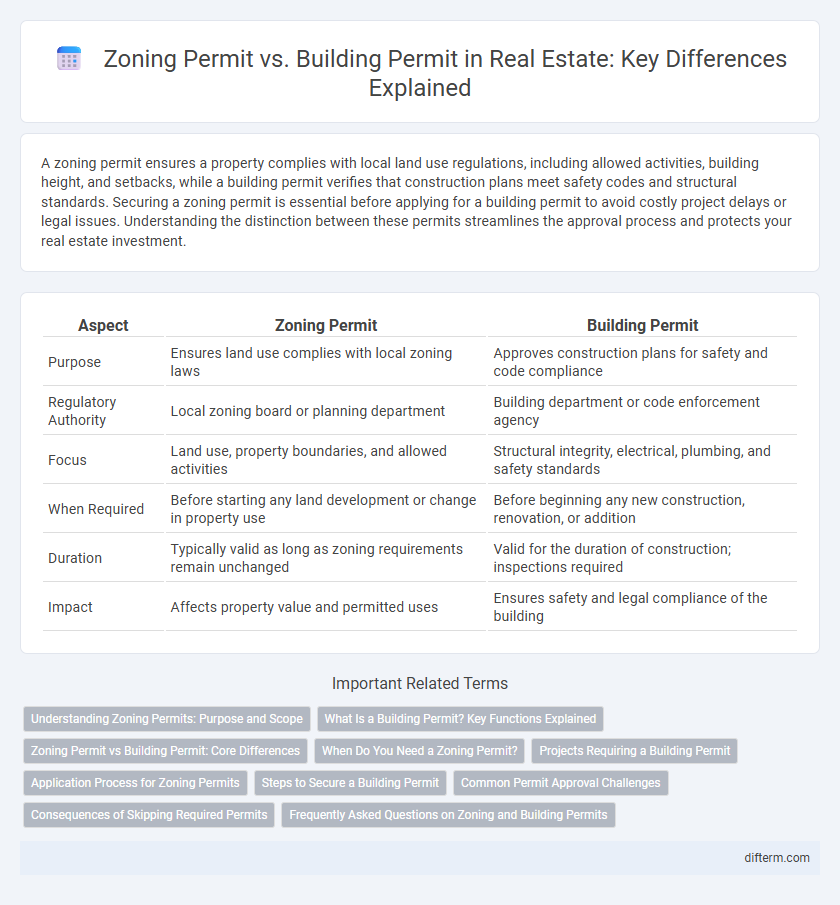A zoning permit ensures a property complies with local land use regulations, including allowed activities, building height, and setbacks, while a building permit verifies that construction plans meet safety codes and structural standards. Securing a zoning permit is essential before applying for a building permit to avoid costly project delays or legal issues. Understanding the distinction between these permits streamlines the approval process and protects your real estate investment.
Table of Comparison
| Aspect | Zoning Permit | Building Permit |
|---|---|---|
| Purpose | Ensures land use complies with local zoning laws | Approves construction plans for safety and code compliance |
| Regulatory Authority | Local zoning board or planning department | Building department or code enforcement agency |
| Focus | Land use, property boundaries, and allowed activities | Structural integrity, electrical, plumbing, and safety standards |
| When Required | Before starting any land development or change in property use | Before beginning any new construction, renovation, or addition |
| Duration | Typically valid as long as zoning requirements remain unchanged | Valid for the duration of construction; inspections required |
| Impact | Affects property value and permitted uses | Ensures safety and legal compliance of the building |
Understanding Zoning Permits: Purpose and Scope
Zoning permits regulate land use by ensuring that property development aligns with local zoning laws, specifying permissible activities, building types, and land use classifications within designated areas. Their scope includes verifying adherence to zoning codes related to property density, setbacks, height restrictions, and land designation to maintain neighborhood consistency and community planning goals. Understanding zoning permits is critical for property owners and developers to avoid violations and ensure projects comply with municipal land use policies before applying for building permits.
What Is a Building Permit? Key Functions Explained
A building permit is an official approval issued by local government authorities that allows the commencement of construction, renovation, or demolition projects, ensuring compliance with safety codes and zoning regulations. It verifies that the architectural plans meet established standards for structural integrity, fire safety, and accessibility, protecting both occupants and the community. Obtaining a building permit is essential to avoid legal issues and ensure inspections are conducted throughout the project lifecycle.
Zoning Permit vs Building Permit: Core Differences
Zoning permits regulate land use and ensure that property development complies with local zoning laws, including restrictions on building types, sizes, and purposes. Building permits focus on construction aspects, verifying that the project meets safety codes, structural standards, and building regulations. Securing both permits is essential for legal and compliant real estate development, with zoning permits addressing where you can build and building permits governing how the construction must be done.
When Do You Need a Zoning Permit?
A zoning permit is required when you plan to use or develop land in a way that complies with local zoning laws governing land use, such as changing the property's designated purpose from residential to commercial or adding structures within specified setbacks. This permit ensures the proposed use aligns with zoning district regulations, including restrictions on building height, density, and land use categories. Obtaining a zoning permit is often the initial step before applying for a building permit to begin construction or renovation.
Projects Requiring a Building Permit
Projects requiring a building permit include new construction, major renovations, and structural modifications that impact the safety and integrity of a property. Unlike zoning permits, which regulate land use and ensure compliance with local zoning laws, building permits focus on adherence to building codes, structural standards, and safety regulations. Obtaining a building permit is essential to legally proceed with construction activities and avoid fines or project delays.
Application Process for Zoning Permits
The application process for zoning permits involves submitting detailed plans that demonstrate compliance with local zoning codes, including land use, building height, setbacks, and density requirements. Applicants typically need to provide site maps, legal descriptions, and sometimes attend public hearings or zoning board meetings for approval. The zoning permit ensures that the intended use of the property aligns with municipal zoning regulations before a building permit can be issued.
Steps to Secure a Building Permit
Securing a building permit begins with submitting detailed architectural plans to the local zoning authority to ensure compliance with zoning regulations, followed by a thorough review process. Applicants must then complete required forms, pay applicable fees, and may need to obtain additional approvals, such as environmental clearances or utility connections. Once all criteria are met and inspections are scheduled, the building permit is granted, authorizing legal construction activity.
Common Permit Approval Challenges
Common challenges in obtaining zoning permits versus building permits include discrepancies between land use regulations and construction plans, leading to extended review periods. Zoning permits often face delays due to non-compliance with local zoning codes, whereas building permits are frequently held up by incomplete technical documentation or failure to meet safety standards. Navigating overlapping jurisdictional requirements and ensuring all applications align with municipal guidelines are critical to avoiding permit approval setbacks.
Consequences of Skipping Required Permits
Skipping required zoning and building permits in real estate development can lead to costly legal penalties, including fines and mandated demolition of unauthorized structures. Unpermitted construction often results in voided insurance coverage and reduced property values, complicating future sales or refinancing efforts. Compliance with zoning and building permits ensures adherence to safety codes, zoning laws, and municipal regulations, preventing costly delays and protecting long-term investment value.
Frequently Asked Questions on Zoning and Building Permits
Zoning permits regulate land use, ensuring property development aligns with local zoning laws concerning building type, size, and placement, while building permits focus on the safety and structural integrity of the construction project. Homeowners and developers commonly ask how long the approval process takes, what documents are required, and whether a zoning permit must be obtained before applying for a building permit. Understanding these key differences and permit sequences helps prevent legal issues and construction delays in real estate development.
Zoning Permit vs Building Permit Infographic

 difterm.com
difterm.com